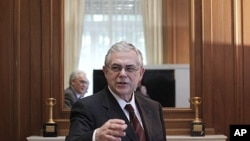Greek Prime Minister Lucas Papademos says his country faces an "uncontrolled default" unless worker unions and employers can agree on wage cuts to boost Greece's economic competitiveness.
The interim Greek leader met with labor leaders and business representatives Wednesday, warning them that international creditors will not approve a new $169 billion bailout for Greece unless significant wage and financial bonus reforms are imposed.
But one labor chief rejected any wage reductions for Greek workers.
Yannis Panagopoulos, president of the General Confederation of Greek Workers, said his members "are not willing to take a single step back" in the face of any wage-reduction demands.
The European Union, the International Monetary Fund (IMF) and the European Central Bank have asked the Greek government to change the country's wage agreements as a way to boost its competitiveness with other countries in the 17-nation bloc that uses the euro currency. Until now, Greece has rejected the request, fearing that it would worsen the country's economic conditions and force more layoffs of workers.
A new private survey showed that business activity in the eurozone contracted in December for the fourth consecutive month, the latest sign that Europe is falling into recession.
Markit Economics said its index of manufacturing and service industries rose slightly last month, but still remained below the mark that would indicate economic growth. Europe's economic fortunes have been weighed down by the continent's governmental debt crisis and imposition of austerity spending plans that has curtailed growth. Greece, Ireland and Portugal have already been forced to secure bailouts and now Greece is trying to finalize details on its second package.
Analysts said the slowdown in the eurozone's economy could force the European Central Bank to reduce its already record-low one percent benchmark interest rate to spur economic growth. Worries about inflation in the eurozone have eased, with the annualized rate falling in December to 2.8 percent, down from three percent the month before.
Some information for this report was provided by AP, AFP and Reuters.




